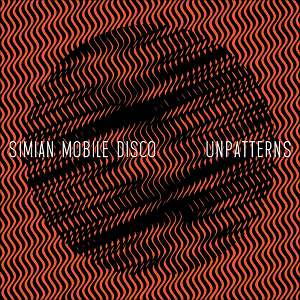Simian Mobile Disco Unpatterns
It was never entirely fair that Simian Mobile Disco got lumped into the whole electro-house […]

It was never entirely fair that Simian Mobile Disco got lumped into the whole electro-house movement back in the mid 2000s; really, it was just the result of convenient marketing. James Ford and Jas Shaw had simply emerged from the ashes of UK pop outfit Simian as a couple of talented and knowledgable producers with an impressive arsenal of analog gear and a propensity for hook-heavy dance tunes, all of which eventually culminated as a few larger-than-life singles. Really, it was just a coincidence of timing that these two Brits became the unwitting godfathers of one of the more gaudy moments in club music’s past. So, when SMD followed its excellent debut LP with a record of try-hard electro-pop tracks, it felt wrong; it sounded wrong, too. The list of high-profile vocalists featured on Temporary Pleasure practically overshadowed the two artists who actually made the music. The producers also appeared to have set their sights on the radio rather than the club when writing the album, and its soul was compromised as a result. What a relief it is then that Unpatterns, the third long-player from Ford and Shaw, places its focus squarely where it belongs: the dancefloor-specific beats and single-appropriate hooks of the pair’s unique production style.
It may have taken about five years, but yes, Simian Mobile Disco got good again—really good, actually. And what better time for the duo to re-emerge as a viable source for tasteful tunes? Electronic music is undoubtedly in the midst of a budding renaissance, elements of which Ford and Shaw nod to throughout Unpatterns. The glowing pads found in jams like “Your Love Ain’t Fair” have plenty in common with those utilized by the Hotflush elite; their newfound interest in vocal samples—as heard on opener “I Waited for You” and standout single “Put Your Hands Together,” among others—is a potentially hazardous turn for the ubiquitous that the boys manage to keep from sounding tired; “Seraphim”‘s acid references are particularly in vogue as of late. It can give off the impression that SMD took a glance at what the kids behind the DJ booths are up to these days, and decided to show them that a couple of relative old-timers can play ball, too.
That’s not all to say Simian Mobile Disco owes these ideas entirely to its younger contemporaries. We’ve heard sounds like this in the pair’s past work. You can easily make comparisons between Unpatterns and early tracks like “Tits & Acid,” “Simple,” or even “I Got This Down,” so it wouldn’t be a stretch to say they had some kind of peripheral influence on the current crop of burgeoning artists. (At least the duo was working in realms similar to what’s being released today before the newcomers even picked up a copy of Ableton.) And many of the strongest tunes on the album are cut purely from Ford’s and Shaw’s self-made cloth. Dark and cavernous, “Interference” features a synthline rendered in a number of familiar analog waveforms, cutting through a massive, reverb-heavy drum-machine pattern not unlike many heard on Attack Decay Sustain Release. The skipping sequencer groove, churning rhythms, and subtle atmospheres of “Cerulean” present SMD’s warm and roomy production aesthetic in its purest form, as does the deep, acid-y pulse and handcrafted sound effects on “A Species Out of Control.”
With nine tracks clocking in at just under an hour, Unpatterns was obviously made as a collection of club-focused tunes—somewhat of a far cry from the crossover pop potential found in much of Simian Mobile Disco’s past output. But the way these tracks have been produced (soft, rounded, and airy) doesn’t actually lend itself to contemporary DJs, who often rely on tracks with tighter frequency ranges, more punchy mastering, and far less atmospherics. It puts Ford’s and Shaw’s album in a difficult position: Where will it be played outside of their own DJ sets and exceptional live performances? At this point in their career, however, playability doesn’t seem to be a major concern for the pair, and maybe they’ve made some of their best music to date because of that. Instead of worrying about skirting genre tags and writing hits, SMD used Unpatterns to focus on who they are as producers and find where they belong in the ever-widening world of electronic music. What they discovered lies beyond DJ mixes and radio rotations; it’s their magnum opus.

